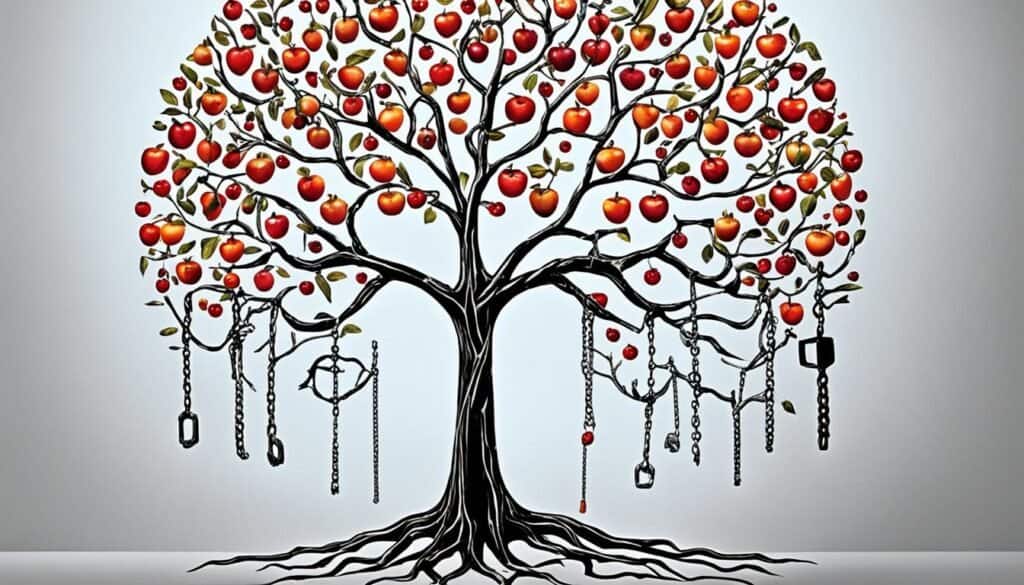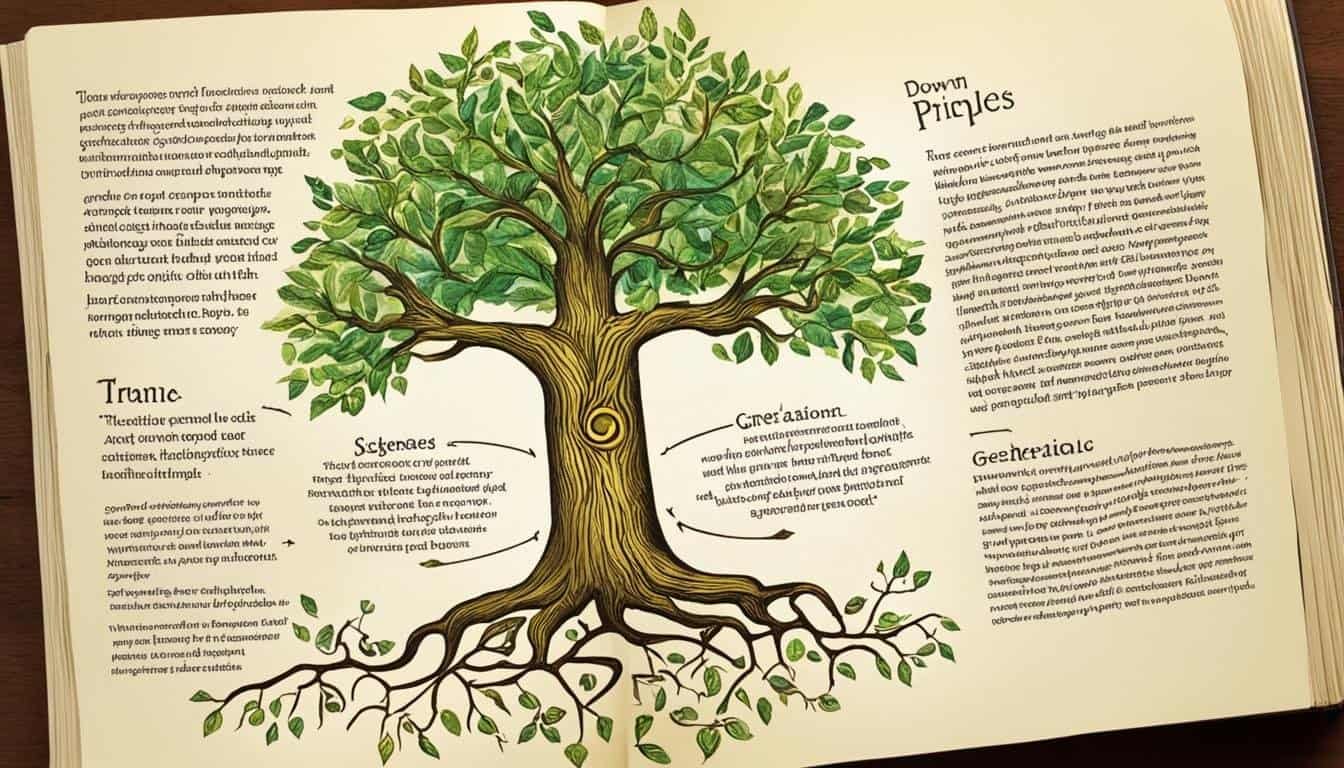Ever wondered how to navigate life? Where we can find guidance on personal growth, forgiveness, and resilience? The book of Genesis has timeless wisdom for these. It’s an ancient text, yet its principles remain relevant today.
We are about to explore 10 life principles from Genesis. These principles will guide us in embracing new starts and the importance of forgiveness. They help us understand relationships, making smart decisions, and living our true purpose. Let’s see what Genesis teaches us.
Key Takeaways:
- Genesis offers valuable life principles that resonate with us today.
- Embracing new beginnings can lead to growth and fulfillment.
- The power of forgiveness can heal deep wounds and restore relationships.
- Resilience in adversity is key to personal growth and leadership.
- Maintaining honesty and integrity is vital in building trust and preventing discord.
The Power of New Beginnings
The book of Genesis reveals how powerful and meaningful new starts are. It starts with the creation story and goes on to tell about people like Noah and Abraham. These stories show us how starting anew brings growth and change. They highlight the amazing potential in fresh beginnings.
Genesis starts with the story of God creating everything. This tells us the universe had a beginning, full of endless possibilities. It reminds us that all good things start with a strong and amazing start.
Later in Genesis, there’s Noah’s story and the flood. Because of humanity’s wrongdoings, the earth was destroyed. But Noah and his family got a second chance. This shows that even from bad times, new beginnings can arise. It teaches us to start fresh, even when things seem tough. Noah’s faith made new hope and fresh starts possible.
Abraham’s story in Genesis is another great example. God tells Abraham to leave everything familiar and start a new life. This shows us the boldness and success of daring to begin again. It shows how much we can achieve with a leap of faith into the new. By doing this, Abraham starts a deep relationship with God and becomes the ancestor of a great nation.
“In the beginning, God created the heavens and the earth.”
Genesis tells us beginnings are essential. They direct our life paths and let us grow. Starting fresh helps us leave behind what holds us back. It leads to transforming our challenges into opportunities. It encourages us to face life boldly, with new hope and faith.
Genesis reminds us of a beginning’s lasting impact on our future. It tells us to see new starts as chances to grow and change. As we journey through life, let’s treasure the power each new beginning brings.
| Character | New Beginning |
|---|---|
| Noah | Surviving the Great Flood and rebuilding humanity |
| Abraham | Answering God’s call and embarking on a journey of faith |
| Joseph | Rising from slavery to become a powerful leader in Egypt |
Stewardship Over Creation
The book of Genesis talks about taking care of the earth. In Genesis 1:28, it is said we must look after the planet. This lesson reminds us that we are responsible for the well-being of Earth and its resources.
Our role as stewards means we should protect the environment. We should use less energy, save water, and try to produce less trash. Living sustainably is key to keeping our planet healthy for our kids and grandkids.
We must embrace green energy to fulfil our stewardship. Using solar or wind power helps stop global warming. It also makes the air we breathe cleaner and fresher.
Protecting Earth’s diversity is also our duty. Genesis shows us that every living thing is important. We can help by supporting sanctuary efforts and speaking up for animals and their homes.
Stewardship is about more than just the Earth’s physical state. It involves appreciating the beauty of nature. Activities like hiking and gardening can deepen our connection to the planet.
Being good stewards lets us positively change the world. Our choices matter for Earth’s future. Let’s aim to protect our home and its creatures. This way, we leave behind a planet that future generations will cherish.

The Consequences of Disobedience
The tale of Adam and Eve in Genesis 3 tells us about the big impact of our choices. It warns us that what we choose can change our lives. This story is a strong message about making smart choices to avoid bad outcomes.
God gave Adam and Eve a clear rule about the tree of knowledge. They let temptation win and broke God’s rule. This choice brought sorrow, sin, and distance from God. It shows us how wrong choices can change everything.
This story is a lesson about how our decisions affect many lives. It tells us to think deeply before choosing, understanding the possible results. We should always consider how our choices can shape our future.
“Actions have consequences, and sometimes those consequences can be significant. The story of Adam and Eve highlights the profound truth that our choices matter, and they can shape the course of our lives and the lives of others.”
Adam and Eve’s story helps us see the power of our choices. It encourages us to think carefully before deciding. By checking if our choices match our values, we can avoid regret.
Considering the Repercussions
It’s important to think about what might happen because of our choices. Thinking ahead helps us pick the best path that fits our bigger goals. This way, we can control our lives with more wisdom.
Knowing what might result from disobedience also talks about taking charge of our lives. It tells us that our decisions matter not just for us, but for others too. This makes us stronger, helping us choose for the good of everyone.
| Key Takeaways |
|---|
| 1. Our actions have consequences, and it is essential to consider the potential outcomes before making decisions. |
| 2. The story of Adam and Eve serves as a cautionary tale, emphasizing the long-term effects of disobedience. |
| 3. Reflecting on the repercussions of our choices allows us to make more informed decisions and align them with our values. |
| 4. Personal responsibility is crucial in understanding the impact of our decisions on ourselves and others. |
The Strength of Faith
Abraham showed amazing faith and trust in God from Genesis 12-22. He followed God’s path even when the future seemed unclear. This led him to overcome many challenges and see God’s promises come true.
God asked Abraham to leave his home in Genesis 12. Abraham had to go to a new land, which God would show him. This was a big step into the unknown for Abraham. He showed great courage and trust in God’s plan, even with the uncertainty.
“By faith Abraham, when called to go to a place he would later receive as his inheritance, obeyed and went, even though he did not know where he was going.” Hebrews 11:8
Abraham faced many challenges during his journey. One big test was when God promised him a son through Sarah, his old wife. This promise seemed impossible, but Abraham trusted God fully.
“Against all hope, Abraham in hope believed and so became the father of many nations, just as it had been said to him, ‘So shall your offspring be.'” Romans 4:18
Abraham shows us why it’s key to hold onto faith and trust in God’s promises. Even when life is tough or uncertain, it’s vital to have faith. Knowing God’s faithfulness lets us walk through life confidently, regardless of what we face.

| Lessons from Abraham’s Journey | Key Scriptures |
|---|---|
| 1. Embrace the unknown | Genesis 12:1-4, Hebrews 11:8 |
| 2. Trust in God’s promises | Genesis 15:6, Romans 4:18-21 |
| 3. Persevere through trials | Genesis 22:1-19, Hebrews 11:17-19 |
| 4. Experience the rewards of faith | Genesis 17:1-8, Hebrews 11:11, Romans 4:20-21 |
Looking at Abraham’s journey, we find lessons for our own. Following Abraham’s faith can deepen our trust in God. It strengthens our bond with Him and helps us through life’s unknowns. Live by faith, and you’ll see God’s promises come true.
Resilience in Adversity
In Genesis, we learn from Joseph’s life about facing challenges with strength. His story is filled with betrayal and hardships. But, Joseph kept his integrity and faith, eventually becoming a leader.
Joseph’s journey starts with his brothers’ jealously, who sold him into slavery. He was wrongly put in jail for many years. Yet, he stayed true to his beliefs, trusting in God.
His resilience shines when he gains authority in Potiphar’s house. Joseph kept his morals, even when blamed wrongly by Potiphar’s wife. This led him to a position of great influence.
Even in prison, Joseph found favor. His ability to interpret dreams helped him rise to power in Egypt. Through it all, he never lost faith.
Joseph’s story shows that keeping faith and being true to ourselves leads to better days. Resilience can change our lives in surprising ways, just like Joseph’s life changed.
“So Joseph found favor in his sight and attended him, and he made him overseer of his house and put him in charge of all that he had.” – Genesis 39:4
The Power of Forgiveness
Joseph’s story is also about the strength of forgiveness. Despite his brothers’ betrayal, Joseph forgave them. This act brought his family back together.
Choosing to forgive can bring peace and healing. It freed Joseph from anger and brought his family closer. Forgiveness’s power is truly transformative, as seen in Joseph’s life.
Joseph’s Resilience in Scripture
Joseph’s tale shows the lasting lessons of the Bible. It tells us that staying true to our values can turn our lives around. Even in the toughest times.
His story is not just a story; it’s a guide for those going through hard times. Joseph’s faith, integrity, and forgiveness stand as lessons for us all.
Table
| Lessons from Joseph’s Life | Key Scripture |
|---|---|
| Resilience in adversity leads to redemption and leadership | Genesis 37-50 |
| The power of forgiveness and reconciling broken relationships | Genesis 45-50 |
| The importance of maintaining integrity in challenging circumstances | Genesis 39 |
| Trusting in God’s faithfulness and providence | Genesis 39-41 |

The Impact of Favoritism in Families
In the book of Genesis, we see how favoritism can harm a family. The way Jacob favored Joseph led to problems. This story is a warning about the dangers of showing favoritism in a family.
“Now Israel loved Joseph more than any of his other sons, because he had been born to him in his old age; and he made an ornate robe for him.” (Genesis 37:3)
Jacob’s preference for Joseph made the other sons resentful. It created a lot of jealousy and bad feelings. In the end, Joseph was sold as a slave, and the family broke apart.
“When his brothers saw that their father loved him more than any of them, they hated him and could not speak a kind word to him.” (Genesis 37:4)
This story teaches us why it’s crucial to treat all family members equally. If we pick favorites, it can cause harm. This includes creating bitterness and tearing up family bonds.
Instead, we must aim for fairness and include everyone in our families. All family members are special and should feel loved. Doing this helps build strong family relationships and avoids conflicts.

| Effects of Favoritism in Families | Consequences |
|---|---|
| Increased sibling rivalry | Creates a sense of competition and resentment among family members. |
| Emotional harm | Leads to feelings of neglect, low self-esteem, and insecurity in unfavored family members. |
| Breakdown of trust | Favoritism erodes trust within the family, damaging relationships and creating a hostile environment. |
| Long-lasting impact | The repercussions of favoritism can extend into adulthood, affecting the way individuals form relationships and perceive themselves. |
By understanding the Jacob and Joseph story, we can improve our families. Showing everyone in our family the same love and respect makes a better home. It also brings family members closer together.
The Power of Forgiveness
In the book of Genesis, a story shows how forgiveness changes lives. Joseph was betrayed by his brothers. They sold him as a slave. Years later, Joseph forgave them despite his hardships.
Joseph’s forgiveness changed everything. It healed wounds and fixed broken relationships. This act shows that we can overcome anger and bitterness. Joseph forgave to move towards a future of peace and healing.
“As for you, you meant evil against me, but God meant it for good…” – Genesis 50:20
This quote shows Joseph’s forgiving heart. He saw God’s plan through the betrayal. Forgiveness, Joseph knew, leads to healing and restored relationships.
Forgiveness is a gift of grace and love. It lifts the burden of anger and lets us move on. It takes courage and humility to choose forgiveness over revenge.
Choosing to forgive stops the cycle of pain. It opens the door for healing and fosters deeper understanding. This can lead to better relationships and inner peace.
The story of Joseph in Genesis highlights forgiveness’s transformative power. It shows how forgiveness heals, rebuilds, and inspires love and unity.
Benefits of Forgiveness
Forgiveness has many positives for us and those around us. These include:
- Healing emotionally and finding peace
- Less stress and anxiety
- Better health overall
- More empathy and kindness
- Stronger bonds with others
- Growing personal strength
By choosing to forgive, we can enjoy these benefits. Our life becomes more peaceful and fulfilling.
The Importance of Covenant Relationships
In Genesis, the stories of Noah and Abraham’s covenants show us how crucial these relationships are. The promises made then teach us that trust and strong bonds come from honoring commitments, whether to friends, family, or in our faith.
Considering how God promised not to flood the earth again and to make Abraham a father of many, we see what covenant relationships need. They thrive on loyalty, effort to keep promises, and a shared respect for commitments.
A covenant goes beyond a simple agreement; it’s a lasting connection. It’s about swearing to stay with someone through love and trust. These commitments are serious and require the best from those involved.
“Behold, my covenant is with you, and you shall be the father of a multitude of nations.”
– Genesis 17:4
Covenant relationships offer us a safe and stable place. Knowing someone pledges to always be there creates trust and a feeling of being part of something.
When we stick to our covenant promises, we promote a healthy, supportive space for others. These relationships let us feel cared for, enjoy love without condition, and be responsible to each other.
God has faithfully kept His covenant, and we should aim to do the same. These commitments ask us to face issues head-on, work through them, and deepen our connections through resilience and forgiveness.
| Benefits of Covenant Relationships | Foundations of Trust in Covenant Relationships |
|---|---|
|
|
Creating and maintaining covenant relationships take work. It’s about actively forming deep bonds. Through these deep connections, we learn true richness in life and find fulfillment in our bonds with others and with God.
Looking at the covenants in Genesis, let’s commit to our own. Let’s protect and value our covenant relationships, and seek wisdom for new ones.
The Dangers of Deception
Deception can change our lives for the worse. Look at the stories of Jacob and Esau in Genesis 25 and 27. They show how deceit can hurt us and the people we care about. They drove a wedge between them that lasted a lifetime.
Jacob tricked his father into giving him the blessing meant for his brother, Esau. This caused a huge problem. Esau was understandably very upset. Their family was forever changed by this deception.
“When Esau heard his father’s words, he burst out with a loud and bitter cry and said to his father, ‘Bless me—me too, my father!’ But he said, ‘Your brother came deceitfully and took your blessing.'” (Genesis 27:34-35)
Stories like these warn us about the real harm of lying. Lying breaks trust and ruins the ties we have with others. It can lead to deep sadness and can break our integrity.
On the flip side, being truthful helps build strong relationships. When we’re honest, we show respect and care for the people in our lives. This creates a solid foundation for trust.
Choosing to be honest doesn’t just make our connections better. It also follows what the Bible teaches. The Bible talks a lot about telling the truth and staying away from lies.
“Do not lie to each other, since you have taken off your old self with its practices and have put on the new self, which is being renewed in knowledge in the image of its Creator.” (Colossians 3:9-10)
Avoiding lying is a step towards living in truth. It honors those we care about and keeps us close to the values we believe in. By choosing honesty, we open ourselves to real friendships and rewards.
Key Takeaways:
- Deception can harm us and the people we love for a long time.
- The tale of Jacob and Esau shows the downside of deceit and the value of being honest.
- Being honest and true helps us build strong bonds with others.
- Living honestly lines up with what the Bible tells us and praises God.
The Necessity of Moving On
When Abraham is called to leave his homeland (Genesis 12:1), it shows us the value of moving forward. We learn that sometimes, we must leave what’s safe to grow and find our purpose. This lesson is a key theme in Genesis.
“And the Lord said to Abram, ‘Leave your country, your family, and your father’s house for the land I will show you.'” – Genesis 12:1
In Genesis, we see how Abraham starts a new life with faith and obedience. He leaves his home and family to go where God leads him. This bold step leads to the fulfillment of God’s promises and a special covenant.
Abraham’s tale teaches us when to say goodbye to old ways and start anew. This can be quitting a job that doesn’t feel right, leaving a bad relationship, or following our dreams. Moving on encourages us to face our fears and welcome new chances.
Like Abraham, we can find blessings and create a legacy if we’re brave enough to move on. It leads to growth, finding our true purpose, and being fulfilled. Choosing the unknown over the familiar takes courage but can bring great rewards.
The Rewards of Moving On
Deciding to move on opens the door to many new opportunities. Here’s what we gain when we embrace change:
- Personal growth and self-discovery
- Fulfillment of our true potential
- Opportunities for new adventures and experiences
- Expanded horizons and perspectives
- Freedom from the limitations of the past
- Resilience and adaptability
By understanding the need to move forward, we take charge of our future. It’s not always easy, but the benefits of the unknown surpass staying where we’re comfortable. This choice shapes a path toward our dreams.
Let’s draw from Abraham’s example and welcome necessary changes. Leaving what’s familiar for something new allows us to thrive and brings us a step closer to our purpose. It’s challenging, yet it shows our strength and potential.
Conclusion
The book of Genesis is full of lessons that mean a lot even now. It shows us the value of starting over, forgiveness, and staying strong when things get tough. Genesis is all about love and respect for our families. It talks a lot about being honest and true, warning us about lying and teaching us to live genuinely.
Genesis also stresses the need to keep moving forward to find our purpose. By following its teachings, we can face life’s tests with courage and belief. We’ll learn the power of starting fresh, forgiving, and making strong promises based on truth. When bad times come, we can be tough and come out even better.
The book teaches us about bad choices and their effects, like playing favorites in families. This helps us make our relationships better and understand ourselves and others more deeply. Genesis is like a guide for life, offering deep insights and advice. Let’s use its wisdom to better ourselves and share love, meaning, and joy with others.
Affiliate Disclosure: "As an Amazon Associate I earn from qualifying purchases made from links in this post. We are a participant in the Amazon Services LLC Associates Program, an affiliate advertising program designed to provide a means for us to earn fees by linking to Amazon.com."

